|
Welcoming the New Year
The first major event of the year on the crime fiction social calendar has, in the past, been the annual Hodder and John Murray Crime Party. Thanks to globalisation, rationalisation, the need to have offices on the banks of the Thames and probably other reasons which I do not understand, I think I have to now call this event the Crime Files Party as it includes authors and books from Headline and Quercus as well. I am more than content to do so as it was a quite splendid event attended by a host of authors, editors and the great and good of the crime fiction world, as well as Professor Barry Forshaw.
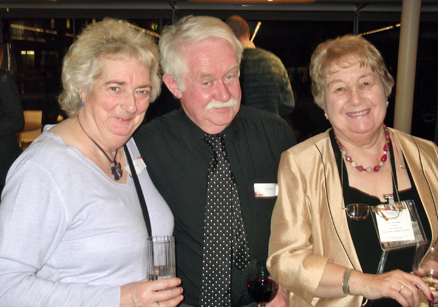
For purely selfish reasons, it was a chance for me to pick the brains of my old chumette Lindsey Davis – the ideal person to advise on my forthcoming archaeological expedition to Pompeii and Oplontis – and to discuss the merits of the Arènes de Lutèce in Paris with Ann Granger. I am ashamed to say that so engrossing was the conversation that I gave neither Lindsey nor Ann a chance to mention their forthcoming books. To set the record straight, it gives me great pleasure to flag up: The Graveyard of the Hesperides, the fourth Flavia Alba book by Lindsey Davis, which is published by Hodder in April, and the Dead Woman of Deptford by Ann Granger, to be published by Headline in June.
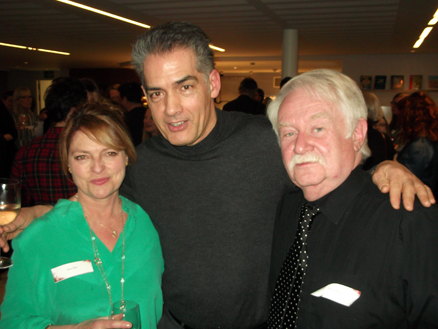
I was so busy congratulating Philip Kerr on his Edgar award nomination (for The Lady from Zagreb which was one of my favourite books of last year) and on Arsenal’s uncharacteristically strong challenge for the Premiership title this year, that I forgot entirely to ask him about his new Bernie Gunther thriller, The Other Side of Silence, which is published by Quercus in March. I have lost track of just how many Bernie Gunther there have been, but I have been a fan since the first one back in 1989, and frankly don’t care what number it is, I just want to start reading it.
During my rush of star-struck fandom, I was incredibly rude not to ask Janet Ellis about her debut novel The Butcher’s Hook which is out this month from John Murray, which I am told is set in 18th century London. I know no more than that at the moment but am determined to atone for my behaviour by finding out more.
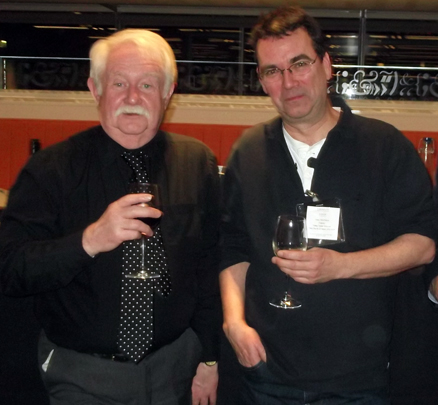
One of the delights of such jamborees is to meet entirely new authors or, in the case of the charming Mick Herron, award-winning authors one hadn’t had a chance to meet before. The latest in Mick’s Gold Dagger-winning ‘Slough House’ series of spy novels is Real Tigers, published by John Murray this month.
Meeting a brand new thriller writer freshly and un-cynically awaiting the publication of his first novel is always delightful, especially when they turn out to be a dedicated fan of the great Eric Ambler, one of the giants of the genre. So few of the younger generation are aware of the rich history of British thriller writing that at times I feel I ought to write a textbook, or at least a primer, for them, so it was refreshing to meet the enthusiastic Peter Hanington, of Radio 4’s Today Programme, whose thriller A Dying Breed is due in April from Hodder’s Two Roads imprint.
The Crime Files party – code-named ‘Warming the Blood in January’ – also gave me a chance to catch-up with the delightful Sarah Sykes, whom I met at the equivalent event last year, and to right a wrong.
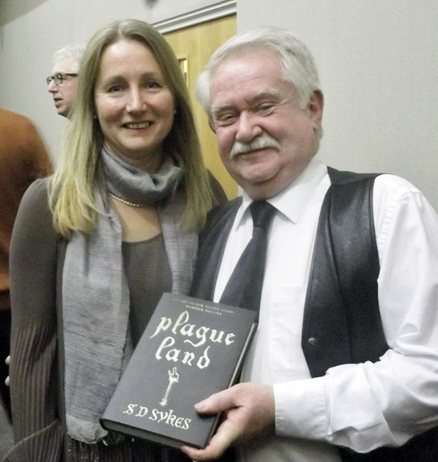 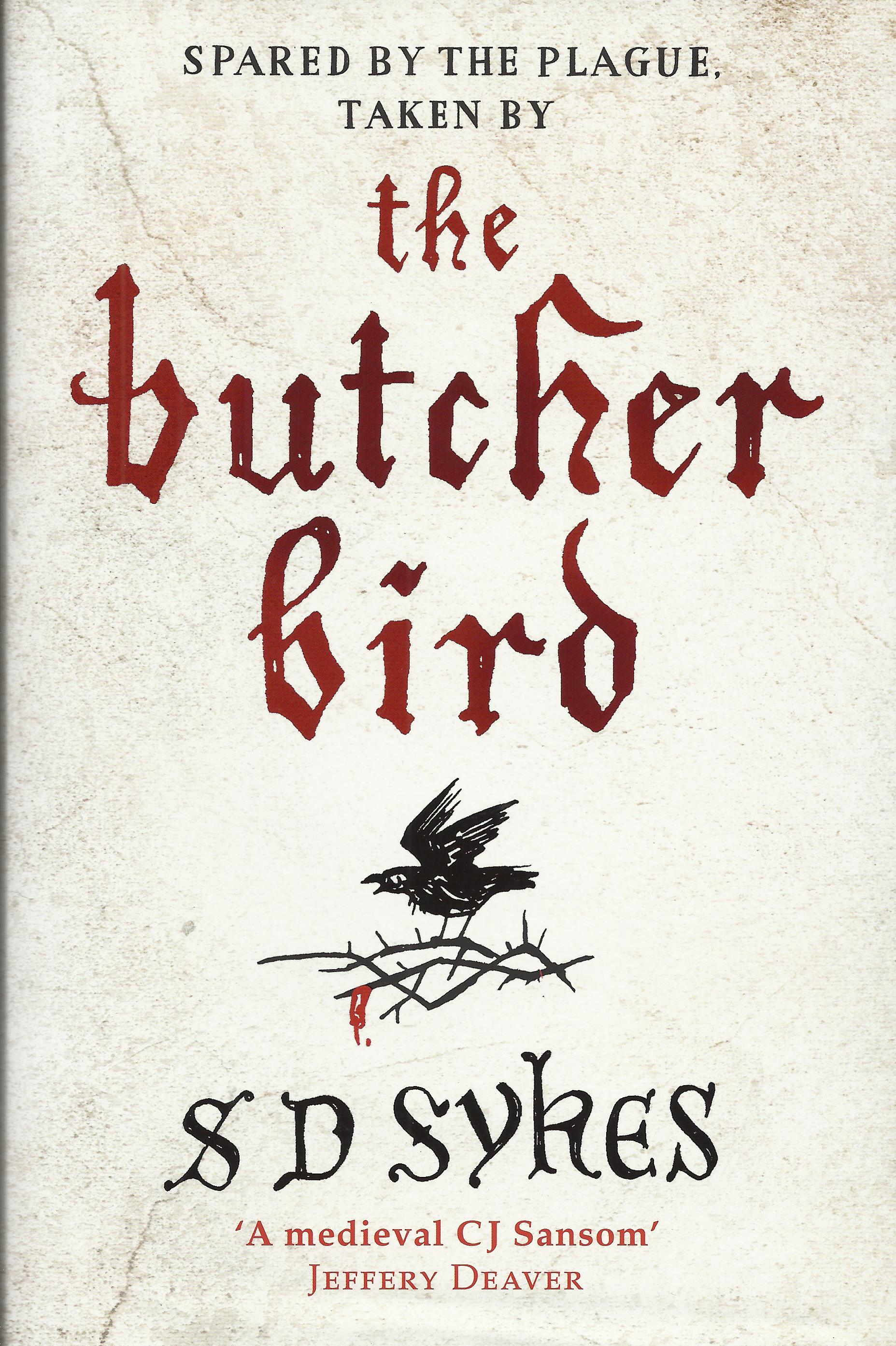
Having been much impressed with Sarah’s debut medieval mystery Plague Land, I was looking forward to the sequel, The Butcher Bird, which was published by Hodder in the Autumn and indeed was asked by her publisher if I would like an advance copy, to which of course I said yes, as I did have some experience of excavating the graves (as an archaeologist, I hasten to add) of victims of the Black Death (1348-50) about which Sarah writes. Sadly, no book ever arrived but the author very kindly put that right on the night and I am now determined to catch up on the adventures of the young Oswald de Lacy, the Lord of Somershill Manor known to only a select few by the wonderful name of Thomas Starvecrow.
Party Snapper
In the absence of the official Shots photographer Prince Ali ‘Snapper’ Karim, who was busy working on his new book Donald Trump: A Conspiracy Theory, I was happy to step in and show my incompetence with the office Box Brownie at the launch of Fiona Barton’s The Widow at the fashionable Goldsboro Books in London’s West End.
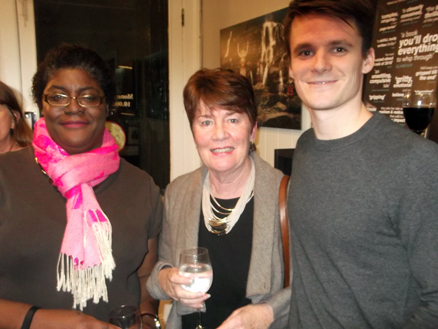
In the midst of the throng I did manage to snap Shots’ very own Ayo Onatade with author Fiona Barton and Bantam publicity supremo Ben Willis as the celebrations began to mark The Widow entering the top half of the best-seller chart almost the minute it was published.
What Else Is New
I am delighted that January also saw new novels from two old and distinguished colleagues of mine, featuring one new heroine and one old favourite hero, both published by Severn House.
In Quick and the Dead, Susan Moody introduces Alex Quick, a resourceful heroine who, being a former police detective, knows how not to contaminate a murder crime scene when she finds one – as she does (and it’s a pretty gruesome one). The Ides of June by Rosemary Rowe sees the return ofher self-effacing but very clever detective Libertus, by profession a mosaicist in second century Roman Britain Glevum, now Gloucester. As usual, Rosemary Rowe’s historical background is spot on. She and I once spent the down time at a book-signing session exchanging Latin obscenities and I can vouch that she knows her stuff. In fact her Foreword to The Ides of June, which sets out the historical and political background of the Roman Empire in AD193 could well be snaffled and used as a seminar paper by an enterprising Classics student –if it hasn’t been already.
 
I do not usually mention recent paperback editions of books I have previously covered but I am happy to make an exception in the case of The Real World of Sherlock byB. J. Rahn, now available from Amberley Publishing.
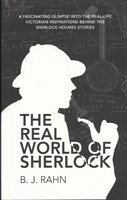
Professor Rahn has added a new section to her book, on ‘Sherlock Holmes and the Fairer Sex’, and some new illustrations including my absolute favourite: a squad of Metropolitan Police detectives in contemporary dress in 1911 and the same detectives going undercover in ‘plain clothes’ on a drugs bust.
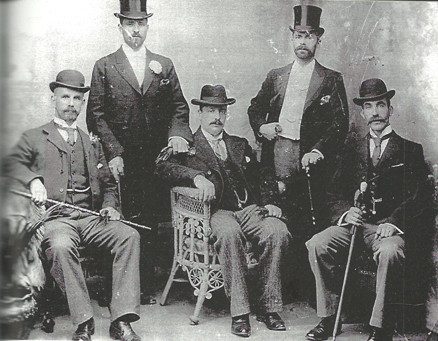
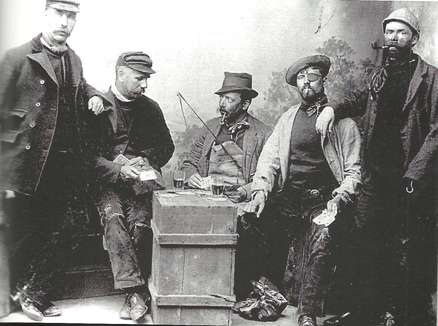
Come to think of it, I’m sure I have seen all of those undercover detectives in The Spice of Life on Cambridge Circus quite recently; but of course they would have been off duty.
All Our Yesterdays
There used to be a television show called All Our Yesterdays which looked back at the news events of 25 years ago that week. Never being one to allow a good format to go un-stolen, I have been flicking through the many scrapbooks chained to lecterns here at Ripster Hall and discovered, in my extensive cuttings collection, the ‘Crime Round Up’ column I wrote for the Sunday Telegraph of 27th January 1991.
My lead review that week was James Ellroy’s L.A. Confidential which I described as ‘Not for the faint of heart…a big, powerful crime novel and possibly the first important example of the genre in the 1990s.’ I also opined that Ellroy ‘has emerged as a unique voice in American crime writing. Comparisons with anyone else are pointless.’ Twenty-five years on I stand by those sentiments.
As indeed I stand by comments on some other cracking releases up for review that month, a quarter of a century ago, although I was slightly grumpy about Elmore Leonard’s Get Shorty, feeling that the Hollywood setting rather took the edge off his expertise with urban noir. Still, I thought the plot twists, dialogue and pared-down prose were, as usual, spot-on. Reginald Hill’s One Small Step was a futuristic fantasy, set in the year 2010, which had his detective duo Dalziel and Pascoe investigating a murder on the Moon, and although ridiculous, it was written by the wonderful Reg Hill and therefore could only be very funny and very clever. The Iciest Sin was another reliably satisfying outing for H.R.F. Keating’s humble but dogged Indian detective Inspector Ghote. As always, Harry Keating starts his novel not with a plot but with a philosophical question: in this case, is it ever moral to blackmail a blackmailer? Alan Hunter’s George Gently books (unlike their more recent television incarnation) were often beautiful reflections of his beloved East Anglia, as here in Gently Scandalous where the Chief Superintendent batters down a local community’s wall of silence with no more violence than that involved in filling his pipe. Trial By Fire was, I’m surprised to read, only the third novel by Frances Fyfield but I am not at all surprised to find that I rated it ‘a very good one … well written, poised and taut with a very attractive hero/heroine pairing of legal prosecutor and local policeman.’
The remaining titles in my January round-up have, I am afraid, slipped from memory. I did report at the time, however, that Annette Roome’s A Second Shot in the Arm was set around a local newspaper of the sort where a reporter is given a camera and told to “go and take a few snaps of the corpse” (in other words, the sort of local newspaper which only exists in crime fiction). I noted that The Becket Factor was ‘a creditable first novel’ by Michael David Anthony, despite introducing 16 characters in the first 20 pages and trying to meld a mystery about the remains of Thomas à Becket to a Cold war plot in an Edwin Drood-inspired ecclesiastical setting. I had a problem with Fat Man’s Shadow, a debut novel set in Turkey by Robin Blake, which plot-wise bit off more than the numerous pit bull terriers in the book could chew. I also notedthat I gave up when the body count topped 19, not including the pit bulls. And I had reservations about the rather quirky Funnelweb by Australian Russell Braddon, a thriller with a psychotic killer who murders a male ballet dancer by placing deadly Funnelweb spiders in his codpiece!
|
|
Eastern Approaches
I have often said, or if I haven’t I should have, that we do not see enough crime fiction from China and Japan here in the UK. Well this month I can sit back and keep quiet, for I have two substantial chunks of oriental crime fiction to digest. Fortunately, both have been expertly translated for me.
 
French Concession by Xiao Bai, from Point Blank, is a historical thriller set in the steaming cauldron of espionage, arms-dealing, organised crime and communist revolution that was Shanghai in 1931. A Midsummer’s Equation, by Keigo Higashino, published by Little Brown, is an unusual ‘whodunit?’ set in contemporary Japan – unusual in that the central detective figure is a physicist who just happens to be known to his colleagues as ‘Detective Galileo’.
Beams and Smiles
I allowed myself a broad grin when I opened the envelope from publisher Black Swan to reveal a proof copy of their new edition of James Crumley’s 1978 classic The Last Good Kiss, which is scheduled to appear in April, and not just because a small – very small – sampler of Kentucky’s finest export was tied to it; though that did sustain my grin for a while.
 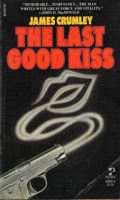
I had been worried that Crumley was in danger of being forgotten, along with his idiosyncratic private eye, or one of them, C.W. Sughrue which is pronounced, according to the author, ‘Sug – as in sugar, rue – as in rue the ******* day’ if I remember correctly.
The Last Good Kiss has a famous opening line about an alcoholic bulldog named Fireball Roberts (trust me on this) and that opening was one of the questions asked in the very first performance of I’m Sorry I Haven’t A Cluedo back in 1999. The first and only contestant to answer correctly was Ian Rankin, so it is entirely fitting that he should write an erudite Introduction to the new edition. Incidentally, Ian will be appearing in a revival of Cluedo at this year’s Crimefest in Bristol in May.
I will raise a small bourbon-and-branch to the memory of the late, great James Crumley, a true poet of American crime writing, although when I met him – some twenty years ago – he was drinking Morland’s Old Speckled Hen with great relish, as I recall.
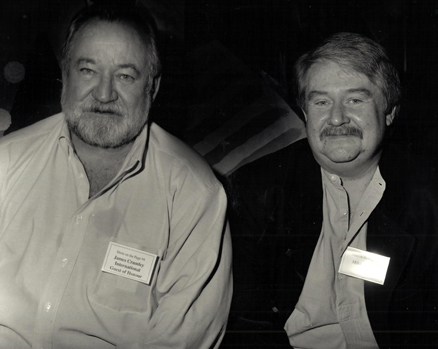
Remembering the Boss
And speaking of masters of the American hardboiled crime novel, I am reminded by Lee Child that in July we should be marking the centenary of the birth of the one that most other crime writers call – or should call – ‘The Boss’.
John D. MacDonald (1916-1986) was a prolific author, one of the very few who could genuinely be held up as proof that you can have both quantity and quality, which we all know is not the norm in crime fiction. He wrote numerous top-notch stand-alone thrillers but is probably bestknown for his 21-book series featuring Travis McGee – not exactly a private eye, more a ‘salvage consultant’ who recovers lost property for a percentage fee which goes towards his ongoing retirement from the day-to-day grind and supports his life on his Florida houseboat The Busted Flush. All the McGee books are excellent crime novels and taken together form a virtual economic history of the Florida coastline and stand as one of the great achievements in mystery fiction.
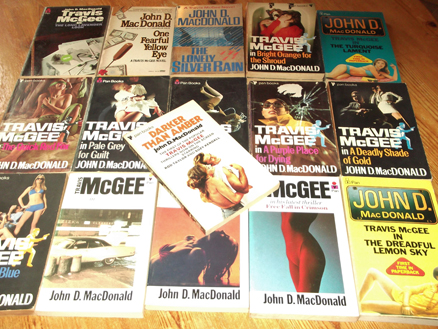
I freely admit that as a fledgling crime writer I was influenced by MacDonald’s knack of describing the ‘languid sleaze’ (as Carl Hiaasen said) of Travis McGee’s world. McGee was a hero who had not so much dropped out as simply refused to drop in, making him an excellent observer of society’s foibles and failings, and his slightly rootless, no ties, no responsibilities, existence but with his own high moral code, were character traits almost certainly borrowed for my own fictional protagonist, Roy Angel.
When my first novel appeared, it was reviewed rather scathingly by fellow Crime Writers’ Association member Hugh C. Rae for a newspaper called Scotland On Sunday who regarded it as a poor attempt to do a ‘humorous’ version of a Ross Macdonald novel.
I was naturally furious; not particularly at the bad review, but rather that a fellow member of the CWA – which I had just, proudly, been allowed to join – did not know the difference between John D. MacDonald and Ross Macdonald! When I became crime fiction reviewer for the Sunday Telegraph the following year, I determined that I would keep an eye out for the next crime novel by Hugh C. Rae in order to give it a totally impartial and objective review … As it turned out, there never was one, or at least I was never sent one for review, as Hugh C. Rae had found great success under one of his several pen-names in a different genre and was now better known as Jessica Stirling.
Nordic News
Back in 2013 I predicted that given the rate of expansion of ‘Nordic Noir’ crime fiction, the search for new Scandinavian settings would inevitably encompass the tiny and bleakly beautiful Faroe Islands, where the main industry seems to be the knitwear firm of Gudrun & Gudrun who designed Sarah Lund’s jumpers in The Killing. As usual, I have been proved right. In 2014, Craig Roberston produced The Last Refuge and this month, Titan Books publish The Blood Strand by Chris Ould.
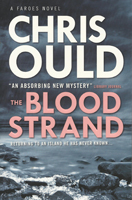
This is, I believe, Chris Ould’s first adult crime novel, though he had a long track record of scriptwriting for television, on shows including Emmerdale, Casualty and The Bill.
Another new entry in the ‘Scandi-crime’ stakes, coming in April from Harvill Secker, The Crow Girl, also has show-biz connections in that the author, Erik Axl Sund, which is actually the pen-name of a collaborative pair of Swedish rock musicians and artists Jerker Erikson and Axlander Hakan Sundquist.
Originally conceived as a trilogy (sound familiar?), The Crow Girl will appear in English as one hefty, 750-page volume, which will weigh in at over 2lbs 2 oz. As a hardback, it could well make a useful murder weapon should Scandinavian crime writers start to run out of inspiration, though there seems to be little danger of that happening. Long ships full of Nordic Noir are likely to continue to appear over the horizon with the inevitable regularity that they did in the Viking days of yore. (‘Yore’ being a technical archaeological term for the period 793-1066 AD.)
What’s New?
There are two novels newly published, both called The Promise, one by American author Robert Crais and one by the talented Alison Bruce, who happens to be an East Anglian neighbour and knows where I live, so with only time to read one, hers is the one I chose and I was not disappointed.
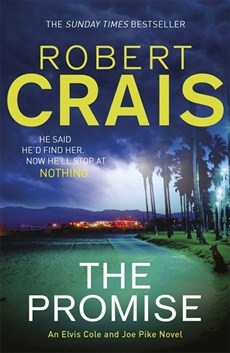 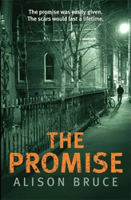
Featuring her police detective Gary Goodhew, now back on duty after previous misadventures, The Promise revolves around the grisly murder of a homeless man in Cambridge’s deserted market square late on a Saturday night. This whole scene is particularly atmospheric, from the description of the arse-end of the Saturday-night drinkers staggering home to the conclusion: It was the point of the night when blood alcohol rose and common sense fell away; once the two crossed over then it became too late to reason with these people.
It might be slightly incriminating to admit how familiar that sounds to me, but I can attest that Alison Bruce’s description of how Cherry Hinton (once a village now a suburb) has been despoiled over the years is both poignant and spot-on, as I used to live there a lifetime ago.
If anyone needed further proof that Alison Bruce can handle a complicated plot, genuine three-dimensional characterisation and provide atmospheric settings whilst avoiding histrionics, then The Promise provides it. You might say it fulfils the early promise that in Gary Goodhew (although he wouldn’t thank me for saying so), she has created an Inspector Morse for Cambridge, which really has been lax in allowing Oxford to get ahead in the game up to now.
What’s Old?
I do hope the Dean Street Press has copyrighted the words “No, me neither” as I find myself using them every time I hear they have discovered another forgotten author of forgotten detective novels from the ‘Golden Age’.
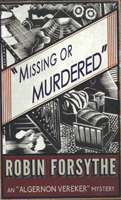
This time it is Robin Forsythe (1879-1937) who was born Robert but seemed to have preferred ‘Robin’, and who wrote a series of detective novels featuring Anthony Vereker – who prefers ‘Algernon’ – a professional artist but an invaluable aid to Scotland Yard when needed. Robin or Robert’s five Anthony or Algernon Vereker novels were published between 1929 and 1936 but have been out of print ever since. Dean Street have republished them all: Missing or Murdered, The Polo Ground Mystery, The Pleasure Cruise Mystery, The Ginger Cat Mystery and The Spirit Murder Mystery.
Dean Street, the British Library and several others are doing a splendid job reviving long forgotten titles, though I cannot help thinking there may be a good reason why some of these titles have been forgotten. I have a bone to pick with Dean Street, however, as in their otherwise very attractive books the text appears to be only justified to the left margin. That would never have passed muster in the Golden Age and I have just checked that all my copies of novels by Philip MacDonald, Edgar Wallace and Francis Beeding, published in the 1920s and 1930s, do indeed have the text justified to both margins.
Booking Essex

The programme has now been published for this year’s Essex Book Festival, which occupies almost the entire month of March, with key events centred on the emerging cultural capital of the East – Southend. In fact the first big crime fiction event of the Festival is The Golden Age of Crime Weekend at the historic Park Inn Radisson Palace Hotel on the seafront there.

The Golden Age Weekend includes sessions to mark the 50th anniversary of the death of Essex legend Margery Allingham (in which I play a supporting role), a panel on the Golden Age itself featuring, among others, John Simenon (son of Georges), one on crime writing’s international appeal, with Anya Lipska, a masterclass by Erin Kelly of the Killer Women collective, and even a chance, on Mother’s Day, to take tea with Cathi Unsworth.
Other events of interest to crime fans include appearances by: Isabelle Grey, Christopher Brookmyre, Lee Jackson (talking about ‘dirty old’ Victorian London), Guy Saville on his alternative history thriller The Madagaskar Plan, Clare Mackintosh, David Thorne, Eva Dolan, Janet Ellis and this year’s Dorothy L. Sayers Lecture, traditionally staged at Witham Library, will be given by Gold Dagger winning writer Frances Fyfield.
 I am slightly worried that the specific venue where both I and Anya Lipska will be performing is known as the Laurel and Hardy Room of the Park Inn Hotel. Surely coincidence, as we are not billed as a double act… I am slightly worried that the specific venue where both I and Anya Lipska will be performing is known as the Laurel and Hardy Room of the Park Inn Hotel. Surely coincidence, as we are not billed as a double act…
Full details of the festival can be found at www.essexbookfestival.org.uk.
Notes and Queries
Although we do not publicise the fact, this column has for many years run a (usually free) service answering queries and researching problems for confused and distraught readers and writers known as The A(nswer) Team. We may have been convicted of books we did not write; but if you have a problem, and you can find us, you can always give us a call.
A recent enquiry, however, has my team of intern researchers absolutely stumped. A distinguished American mystery writer has contacted The A-Team with a query which has distressed him greatly. He has asked for our help in identifying the title of a novel he read many many some years ago. It was a Western and written by Tex Riley, one of the many pen-names used by CWA founder John Creasey and it began with the memorable line: The desert landscape was empty and still except for the solitary coyote soaring silently overhead.
(I am reminded of the review Dorothy L Sayers once gave to a John Creasey novel when she said: "When Mr Creasey cannot find the right word to use, any one will do.")
Does this ring any bells with anyone? If it does, I’d like to get hold of a copy. If it is totally apocryphal, although my American mystery writer friend insists the book exists, then I intend to use that opening line before anyone else does.
Toodles,
The Ripster.
|